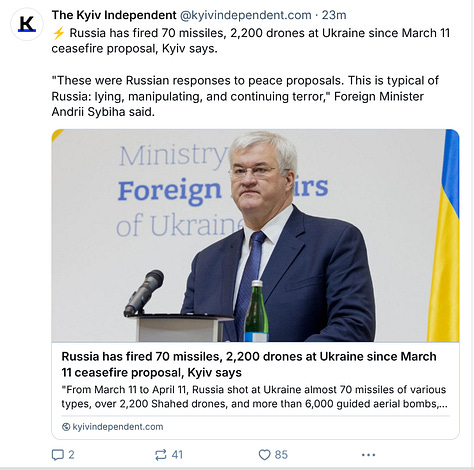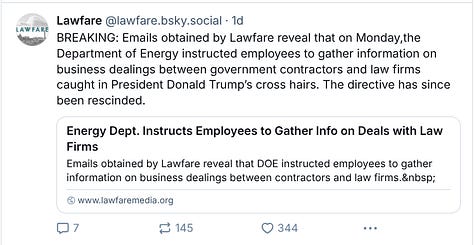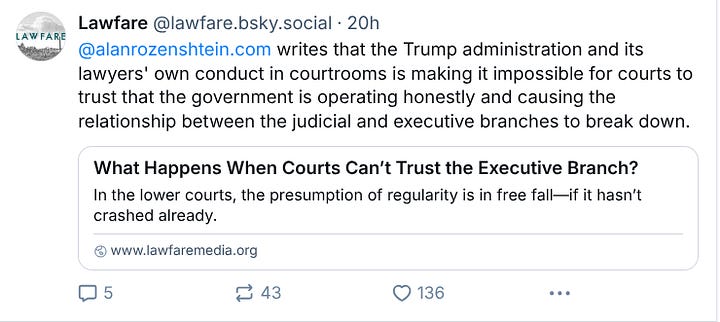Snapshot of the Day
In Bluesky posts from news organizations
Good Morning:







Happy Friday!
Yesterday on #DogShirtTV, the estimable Holly Berkley Fletcher, the estimable Jonathan Rauch, and I discussed childhood antics for a bit. Then we welcomed the estimable Anna Bower to tell us about her ongoing adventures in Trump litigation. Klio got stuck in a bunch of electrical cords:
Today On Lawfare
Compiled by the estimable Caroline Cornett
What Happens When Courts Can’t Trust the Executive Branch?
Alan Rozenshtein examines the erosion of the presumption of regularity—a deference doctrine whereby courts presume that government officials act lawfully— in instances where the government has appeared to act in bad faith. Rozenshtein warns of the profound consequences the loss of this doctrine will have, such as the deterioration of institutional integrity within the Department of Justice and increased attacks on the courts’ authority and legitimacy:
A world in which the government’s actions undermine its claims to a presumption of regularity would have profound consequences.
First, it would put intense strain on the adversarial nature of the legal system. Unlike inquisitorial systems, in which judges actively engage in fact-finding, our system relies heavily on opposing counsel to present their cases vigorously and truthfully. This presupposes a baseline of good faith and candor from all lawyers, particularly those representing the government. When that baseline disappears, the system struggles to function effectively. Courts may feel compelled to adopt more inquisitorial methods, demanding independent evidence and verification even for routine government assertions. This shift toward judicial fact-finding requires more judicial time and resources and courts are ill-equipped for it, having limited investigative resources—perhaps a judicial assistant and a few law clerks—compared to the extensive staff required in a truly inquisitorial system. Moreover, such heightened scrutiny could unduly hinder legitimate, necessary, and time-sensitive government functions, creating inefficiencies and potentially chilling lawful executive action.
New White House AI Policies Introduce Government by AI
Kevin Frazier breaks down new Office of Management and Budget policies that prioritize rapid adoption of artificial intelligence (AI) and minimal “bureaucratic restrictions.” Frazier emphasizes that the success of policies depends on the government’s ability to maintain public trust, balance innovation with safeguards, and involve a diverse set of vendors:
The two policies are underlied by a belief that the federal government ought to lead and encourage AI adoption. This belief goes beyond the idea that the government should merely avoid regulation that hinders private-sector development and use of AI and instead turns the government into an active participant in the diffusion of AI into daily life, including key services and systems. Lynne Parker, the principal deputy director of the White House Office of Science and Technology Policy, celebrated the policies as a manifestation of the administration’s goal to “encourage and promote AI innovation and global leadership,” which she asserted “starts with utilizing these emerging technologies within the Federal Government.
Appointments, Removal, and the Unitary Executive Empowered
Jordan S. Allen, Neil Noronha, Tanner Wilburn discuss the ongoing legal challenges to the Trump administration’s personnel actions, such as firing career civil servants and possibly violating the Appointments Clause. They also explore how recent Supreme Court rulings have chipped away at removal protections for agency heads, thus expanding executive control over personnel and nominally independent agencies:
However, the Supreme Court has recently emphasized that removal protections represent the exception rather than the rule, and in Seila Law v. CFPB, they declined to extend such protections as applied to the director of the Consumer Finance Protection Bureau (CFPB). The Court found that the role qualified for neither historical exception allowing removal protections, as the CFPB director did not mirror a multimember body made up of experts with staggered terms as seen in the Federal Trade Commission, nor did the director qualify as an inferior officer with limited duties as in Olson. Collins v. Yellen relied on this precedent to rule that “for cause” provisions that restricted the president’s removal authority for the director of the Federal Housing Finance Agency were unconstitutional, despite the agency’s more narrow “size [and] role” as compared against the CFPB.
Podcasts
On Lawfare Daily, Tara Varma joins Natalie Orpett to discuss the latest in French politics, including far-right leader Marine Le Pen’s embezzlement conviction and subsequent ban from politics, President Emmanuel Macron’s leadership amidst the upheaval in the transatlantic relationship, and the push to build European defense capacity:
On Rational Security, Scott R. Anderson sits down with Quinta Jurecic, James Pearce, and me to talk through the week's biggest national security news stories, including the Supreme Court’s ruling that detainees under the Alien Enemies Act must challenge via habeas; the Court’s impending review of Humphrey’s Executor and other case law preserving independent agencies; and firings in the Justice Department:
Announcements
On April 23 at 6:30 p.m. ET, Tyler McBrien, Anastasiia Lapatina, Brigadier General (ret.) Kipling V. Kahler, and Emily Horne will join Sasha Ingber for an in-person discussion about the intelligence and diplomatic failures that led to Russia’s invasion of Ukraine. They will talk about Lawfare’s narrative podcast series Escalation, what intelligence in Ukraine looks like today, the turning point Ukraine faces under Trump, and what lies ahead for Ukraine. Register for the in-person program at the International Spy Museum here. Register for the virtual program on Zoom here.
Today’s #BeastOfTheDay is a panda viciously attacking a zookeeper:
Keep reading with a 7-day free trial
Subscribe to Dog Shirt Daily to keep reading this post and get 7 days of free access to the full post archives.




